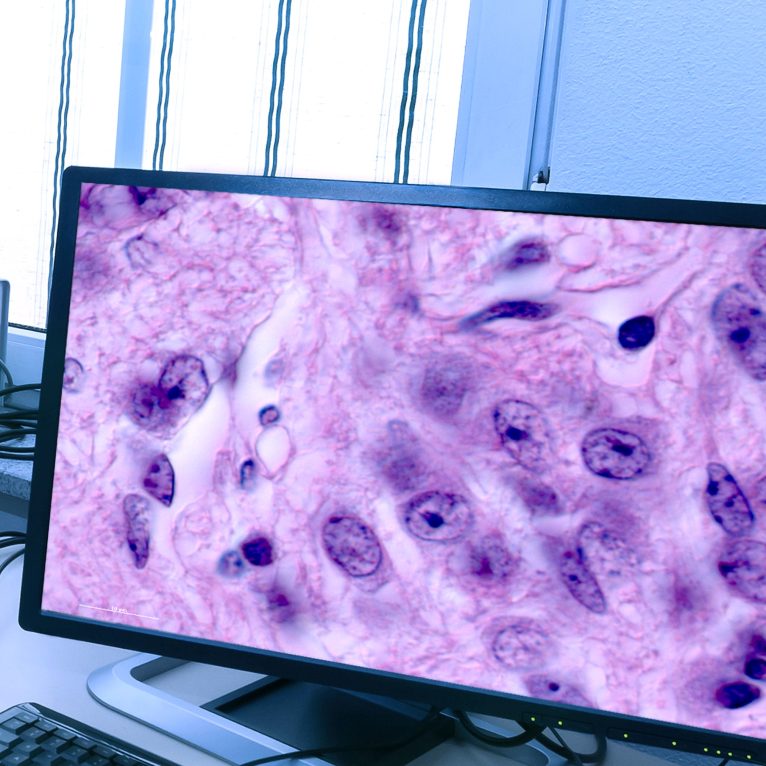
Written by

Cranfield, UK, 5th August 2024, Written by Imogen Fitt –
I hope we all had a lovely July.
I’ll be busy next month publishing Signify Research’s fourth iteration of its Digital Pathology Core Market Report…
If you’re interested in arranging a complimentary briefing on the contents, do reach out and we’ll schedule some time to chat more about our coverage and how we can support your business.
Vendors use our market intelligence in a variety of ways, including smaller start-ups to support commercialisation and fundraising. Having reliable data from an independent external source can provide the validation some investors need for sign-off – reach out via LinkedIn if you’d like to chat further!
Or how about face-to-face at ECP? 🤩 I’ll be attending the conference in Florence from the 8th to the 10th together with Steve Holloway. We’ll be eager to connect with industry experts and learn a little more about how the market is evolving.
Here’s July’s round-up for digital pathology, along with a few Signify Research insights:
- Belated from last month, Nucleai and Proscia announced a partnership to provide the former’s AI Predictive Biomarker algorithms on Proscia’s Concentriq platform. Interest in developing and commercialising imaging biomarkers as digital companion diagnostics (CDx) in clinical trials and diagnostic settings is growing rapidly as was evidenced in some of the conclusions from our recently published ‘Digital Precision Medicine – World – 2024‘ study. Investment is coming hard and fast, particularly from pharmaceutical companies, and it’ll be interesting to watch how this will impact digitisation rates in clinical labs over the mid-term as CDx products gear up for launch. I have my own thoughts on the nuances, but it’s clear that labs do need a better financial incentive to start digitisation in earnest. Proscia also announced last week some updates to its digital pathology software. This included the ability to view and ingest DICOM images and a multi-AI overlay feature which allows users to incorporate multiple results from AI tools across the digital pathology workflow. The ability to use multiple AI algorithms on a single image should help supports users in adopting products from multiple best-of-breed vendors. Now more than ever the market seems to be interested in evaluating the difference between different AI tools, and support from IMS software vendors will be key in supporting this!
- Next, Paige this month announced its ARTICULATE PRO project had reached a new milestone as the company’s Prostate AI suite is now being evaluated in 3 NHS Trust Hospitals. The results of the study will provide evidence for the value of funding further deployment across NHS trusts. So should we expect an English tender at some point like we saw for Ibex in Wales? This I think is quite unlikely, as England hasn’t yet deployed a national LIS, and thus English hospitals are much more likely to begin purchasing as trusts.
- Other news in the UK was that National Pathology Imaging Co-operative (NPIC) partnered with CellPath, a StatLab Company to install 2 WSI scanners on-site and connect them to the NPIC national digital pathology system. The scanners will help to build a digital archive of pathology slides for the 100,000 genomes project, a precision medicine initiative aimed at supporting genomics research across rare diseases or cancers. Pathology and genomics are closely linked disciplines, which are set to become even closer, as clinical practice evolves. By adding digital pathology images into the archive researchers can derive additional insights on tissue features and potentially develop prognostic algorithms to further support patient stratification! That’s the ultimate goal of precision medicine, and digital pathology is emerging as the next technology pillar in its evolution.
- Across the world, 3DHISTECH – The Digital Pathology Company has released a statement announcing Epredia China will be its new distributor in China and that any existing products being serviced will also move to the company. 3DHistech will no longer use its previous distributor JiNan Danjier, which in a previous press release announced it had installed >500 scanners for the company as of August 2021. The press release details the reasoning behind this decision, but for 3DHISTECH this represents a deepening of its existing strong relationship with Epredia. Whilst the two companies are financially linked, could this be an indication that the two will eventually fully consolidate?
- In another Asia Pacific announcement, Indica Labs announced several new reseller agreements in APAC. MRL Cybertec Corporation will be responsible for the Phillipines, Pathology Ware International related to Thailand, Minh Khang Technical Service and Trading Co., Ltd to Vietnam, and Histocenter will be the reseller situated in Malaysia. The press release indicated that the company would actively be pursuing IVD registrations across these markets in the near term, indicating that Indica Labs sees considerable opportunity for growth in the ASEAN region. If you’re interested in accessing numbers around market sizing and forecast growth for Asia do get in touch!
- Next up, I’d like to highlight an academic paper published in The Lancet. Scientists from Weill Cornell Medicine and the Dana-Farber Cancer Institute in Boston have developed new generative AI-based tools for digital pathology based on ChatGPT. The model reportedly provides accurate responses to questions about digital pathology and specifically was quoted as being able to be used to “catch up on many specific topics or techniques in digital pathology”. A second AI program the team developed also helps pathologists use PathML, a library that requires familiarity with Python for DP image analysis. Generative AI, although innovative, is not likely to impact clinical settings or care for quite some time. Concerns around accountability and a lack of regulation are not to be taken lightly, and instead, this announcement is likelier to impact academic circles. Demand for sandbox tool development is present, just take a look at Aiforia Technologies‘s Create software which is being used by institutions like the Mayo Clinic!
- The big industry news this month was that Philips was awarded 510(k) clearance for its newest IntelliSite Pathology Solution 5.1. Congratulations to all involved in securing this, which perhaps signals a shift in competitive dynamics is coming as Philips could use the announcement to make a resurgence.
- Bioptimus is a new company which recently released ‘H-optimus-0’, an open-source AI foundation model for pathology. With 1.1 billion parameters, H-optimus-0 is trained on a proprietary dataset composed of hundreds of millions of images derived from over 500,000 histopathology slides across 4,000 clinical practices. The model can be used to identify cancerous cells and detect genetic abnormalities. Future models will reportedly integrate other modalities, such as genomics and proteomics. Many foundation models have been developed for digital pathology recently, and it’s becoming increasingly hard to compare performance. In general, I think more comparative studies are likely required before commentary can be provided on any one vendor’s performance.
- The last few announcements relate to funding! Scopio Labs has secured $42 Million in a series D round led by Fortissimo Capital. This will be used to accelerate global expansion with a heavy focus on the US where the company has recently gained FDA approval. Scopio will also likely invest some of the capital into R&D to further expand its breadth.
- Indirectly related, but Clarapath has also raised a $36M series B-1 funding round to support the commercialisation of its automated microtomy system, SectionStar, from CU Healthcare Innovation Fund, Mayo Clinic Ventures, Ochsner Ventures. Although upstream of the digital pathology workflow, there was a fair bit of interest in automated microtomy solutions at USCAP a few months ago, and standardising the slide preparation process is likely only to support downstream AI analysis for digital pathology vendors. Whilst in the near term these kinds of solutions might compete in academic settings with scanners for funds, this is still positive news for the digital pathology industry.
- Lastly, special congratulations to Martin Fergie and Spotlight Pathology for raising its seed round of funding from LYVA Labs this month. This puts the company’s total raised to >£1M to help commercialise its algorithms.
That’s all for this month but do subscribe to receive regular updates!
Interested in learning more? If you’re a healthcare technology vendor, VC investor or healthcare institution wondering what opportunity there is for your business in digital pathology drop me a note.
We can discuss how Signify Research’s support can:
- Inform your growth targets and product investment strategy with quantitative data points.
- Support you in evaluating digital pathology’s emerging competitive landscape to assess the impact of announcements and select potential partners.
- Understand adjacent markets such as enterprise imaging, laboratory information systems and the influence these will have on Digital Pathology adoption.
If you’re interested in learning more about what this news means for your business, reach out to me. Or stay informed and engaged with the latest monthly announcements and developments in the digital pathology market by subscribing to my Digital Pathology News Round-up.
About Imogen Fitt
Imogen joined Signify in 2018 as part of the Healthcare IT team. She holds a 1st class Biomedical Sciences degree from the University of Warwick where her studies included molecular biology and pharmacology. Since joining the team Imogen has studied the medical imaging software and hardware markets and is now expanding Signify Research’s Diagnostics and Lifesciences coverage.
About the Diagnostics and Lifesciences Team
The Diagnostics and Lifesciences team provides market intelligence and detailed insights on the multiple healthcare technology markets where the clinical world intersects with the preclinical. Our areas of coverage include digital pathology, laboratory information systems, clinical Real-World Data (cRWD) platforms, oncology information systems, tumour board software, oncology decision support software and radiotherapy IT. Each report provides a data-centric and global outlook of its markets with granular country-level insights. Our research process blends primary data collected from in-depth interviews with healthcare professionals and technology vendors, to provide a balanced and objective view of the market.
About Signify Research
Signify Research provides healthtech market intelligence powered by data that you can trust. We blend insights collected from in-depth interviews with technology vendors and healthcare professionals with sales data reported to us by leading vendors to provide a complete and balanced view of the market trends. Our coverage areas are Medical Imaging, Clinical Care, Digital Health, Diagnostic and Lifesciences and Healthcare IT.
Clients worldwide rely on direct access to our expert Analysts for their opinions on the latest market trends and developments. Our market analysis reports and subscriptions provide data-driven insights which business leaders use to guide strategic decisions. We also offer custom research services for clients who need information that can’t be obtained from our off-the-shelf research products or who require market intelligence tailored to their specific needs.
More Information
To find out more:
E: enquiries@signifyresearch.net
T: +44 (0) 1234 986111
www.signifyresearch.net
